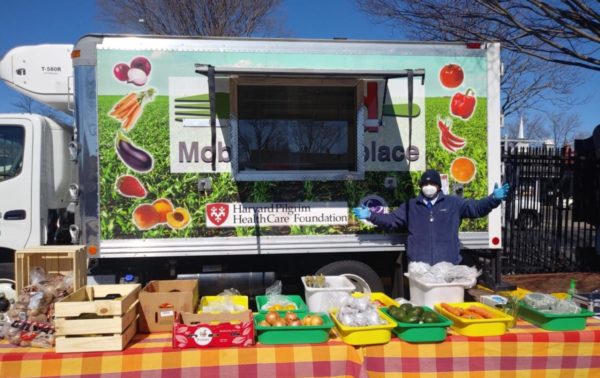Point32Health Foundation helps FEED Center: What you need to know
Point32Health Foundation, the Massachusetts-based nonprofit created by the combination of Harvard Pilgrim Health Care Foundation and Tufts Health Plan Foundation, recently announced a $90,000 grant to The Center for Food Equity and Economic Development (FEED Center) in Bridgeport.

The grant, which will be distributed in $30,000 installments across the next three years, is the latest in more than $270,000 in grants distributed by Point32Health to New England nonprofits operating mobile farmers’ markets. Point32Health’s stated mission is to take steps to ensure people throughout the region are able to live healthier lives, with a special emphasis on inclusive and community-based solutions.
The grant will support the FEED Center’s multifaceted efforts to alleviate hunger and poverty in Bridgeport. The organization is a division of the Council of Churches of Greater Bridgeport and its flagship operation is a mobile food market that accepts both EBT and SNAP. Low-cost groceries are sold out of the truck in the midst of Bridgeport’s “food deserts” —communities where there are no grocery stores offering fresh produce or healthy nutritional options —and also provides access to the disabled and elderly by setting up in front of senior housing facilities.
The FEED Center also stocks its truck with prepared meals produced by students in the culinary training programs the organization runs to provide skills that will help Bridgeport residents find work in restaurants or launch their own enterprises. Those facilities also provide affordable industrial scale kitchens for culinary startups in the region who can also sell food through the truck.
Nora Moreno Cargie, president of Point32Health, said that food is an important consideration for an organization focused on health. In the past, she explained the precursor organizations to Point32Health had developed programs to combat childhood obesity and provide nutritionally tailored meals, but those were “downstream” solutions while improving access to healthier food overall can reduce the need for such programs.
“We really thought about how we might have a greater impact,” she explained, “and we looked at food and what we saw was really reinforced by what happened during the pandemic. Food insecurity was right there, and we saw many people who had never been food insecure before begin to suffer from this. We figured it was time to think about food and meals and how to address families holistically. And we feel that FEED is a great partner to do that.”
Tom Larson, the interim president and CEO of the Council of Churches of Greater Bridgeport, said he was excited because of how the grant can be used to expand the opportunities offered by FEED.
“Here is a mobile market that fits into a broader program at the Council of Churches around food insecurity and culinary employment,” said Larson. “It allows us to buy bulk food at reasonable prices through the mobile market. In addition, we run a culinary skills training program that prepares individuals in the expanding food industry. It also allows us to prepare simple meals, which can be delivered through the mobile market.”
“One of our visions,” Larson continued, “is to promote entrepreneurship in part through the training we provide.”
Much of the produce sold by the truck is sourced through Connecticut farmers. Efforts are also made to minimize the amount of waste sent to landfills by every section of the FEED center’s operations through aggressive composting and by making use of less visually appealing produce in the kitchen. This helps to both reduce costs, since cosmetic damage impacts neither flavor nor nutrition but can’t be sold at full price, and avoid the potential waste of picked over veggies spoiling on the shelf.
“They’re thinking about this holistically,” Moreno Cargie said, “and that’s really encouraging that they made the job training and the distribution all part of the chain.”